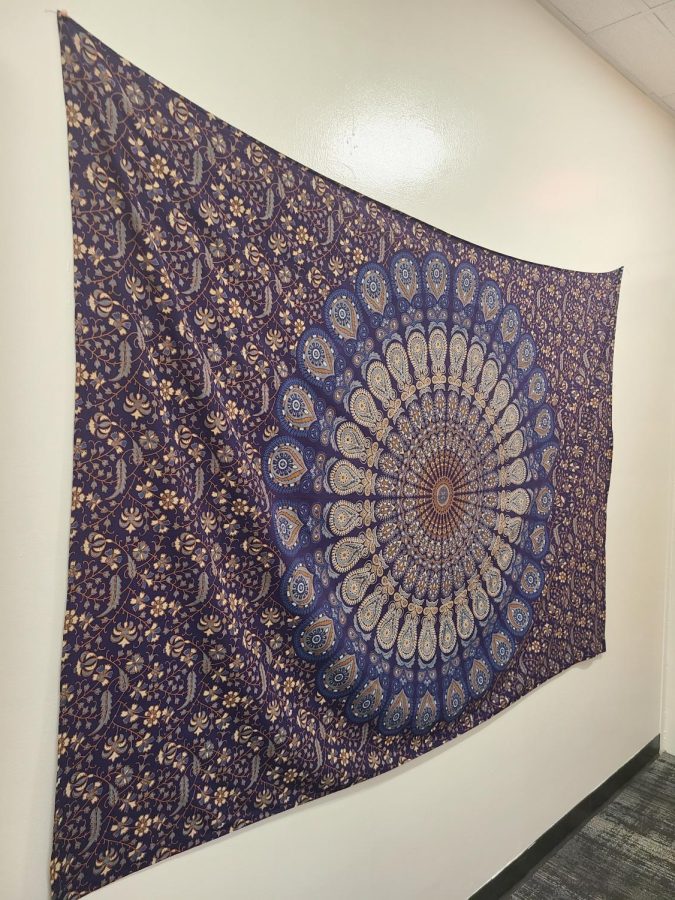How practicing mindfulness can benefit your daily life
Mindfulness is the practice of being aware of your mental state.
A tapestry in the C100 Zen Zone, a meditation space at Lakewood High School on May 1.
Imagine powering up your life by using the concept of mindfulness: awareness of one’s internal states and surroundings.
Mindfulness can help people avoid destructive or automatic habits and responses by learning to observe their thoughts, emotions, and other present-moment experiences without judging or reacting to them. Mindfulness is beneficial to your daily life due to the short and long-term practices which affect your mental reactions and external responses in positive ways.
A way I use mindfulness in my personal life is by practicing meditation, breath work, reading, and journaling (shadow work). These practices have helped me in a way which has allowed me to be aware of how I am feeling and how I choose to react to things. One time, I was skating around a crowd of people–ages from toddlers to adults. I was not the best skater- I was still learning. I found myself panicking when someone would skate near me.
When I would start to panic, that would lead me to eventually falling or skating into someone near me but as time went on, I made myself practice breath work when I felt anxious on the rink. It helped me keep myself calm and focus on my balance.
Overall, mindfulness could be used as a beneficial tool in your daily life, which would be able to allow your internal and external self to reach the state of awareness and calmness. It is a slow process, but as the process becomes habitual, the slow process becomes effective and useful.
Mindfulness and meditation started to become popular around the 1990s, which was popularized in the East by religious and spiritual institutions.
“Studies suggest that mindfulness practices may help people manage stress, cope better with serious illness and reduce anxiety and depression. Many people who practice mindfulness report an increased ability to relax, a greater enthusiasm for life and improved self-esteem,” NIH Health in News wrote.
Interest grabber, topic sentence… Imagine the concept of mindfulness as a ‘power up’ anyone could use at any point of time.
Now what is mindfulness? According to the Oxford dictionary, “mindfulness is a mental state achieved by focusing one’s awareness on the present moment, while calmly acknowledging and accepting one’s feelings, thoughts, and bodily sensations, used as a therapeutic technique.”
Executive Editor of Harvard Men’s Health Watch Matthew Solan, and staff writer and editor of Greater Good magazine Jill Suttie have.
“The point of these brief, daily reflections are to help you tap into calmness whenever life gets too hairy. Practicing everyday mindfulness can also improve your memory and concentration skills and help you feel less distracted and better able to manage crises like dealing with the pandemic,” Solan said.
“In a 2016 study, people with Alzheimer’s disease engaged in either mindfulness meditation, cognitive stimulation therapy, relaxation training, or no treatment, and were given cognitive tests over two years. While cognitive stimulation and relaxation training were beneficial in comparison to no treatment, the mindfulness training group had much more robust improvements on cognitive scores than any other group,” Suttie said.
According to NIH News in Health, mindfulness is beneficial because it can help people destress and be aware of their stressors, cope with mental health struggles and have heighted social skills both long-term and short-term.
Overall, mindfulness could and should be used as a beneficial tool in your daily life, which would be able to allow your internal and external self to reach the state of awareness and calmness.












